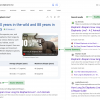Workday is a powerful human capital management software that is suitable for midsize to large businesses in any industry. It offers extensive automation for HR management tasks, industry-specific solutions, and addons for payroll, reporting, and workforce management. Currently used by over 9,500 companies, including major corporations like Chevron and AT&T, Workday can improve workforce management for your business as well. However, Workday does not provide public pricing information and offers custom pricing only.
Key Features of Workday:
1. Thorough automation for most HR management tasks.
2. Industry-specific solutions.
3. Payroll, reporting, and workforce management addons.
People Analytics:
Workday excels at curating HR data and presenting it in easy-to-understand charts and graphs. You can generate automated reports on real-time payroll data and employee metrics. Additionally, Workday offers external benchmark reports to help you compare your company’s compensation, benefits, and employee satisfaction with industry competitors.
Employee Engagement:
Workday offers the Peakon Employee Voice tool, which is an AI-based tool that helps gather information on employee engagement across complex organizations. It allows you to generate employee surveys, receive predictive reports on employee turnover, implement leadership development courses for managers, and gain insights into employee needs.
Skills-Based Recruiting, Hiring, and Employee Development:
Workday Skills Cloud is an AI-based system that enhances Workday’s hiring, recruiting, and ongoing employee development solutions. It helps you find candidates whose skills closely match job descriptions, gain insights into your workforce’s skillset, schedule skill-based training, and optimize workers’ skills for a stronger company.
Cloud-Based Payroll:
Workday offers an add-on product for payroll, which can be included in your custom package. While Workday only processes payroll in a few specific countries, it works with third-party providers like ADP to offer payroll processing in over 100 countries. You can choose to outsource payroll or process it in-house.
Workday Financial Management:
Workday HCM integrates with Workday’s Financial Management platform, which offers comprehensive enterprise accounting features. It automatically updates your general ledger, generates in-depth financial reports, and provides actionable insights with predictive forecasting. The financial management system includes features like automatic bill pay, intercompany invoicing, and expense tracking.
Pros of Workday:
– Excellent integration with third-party software, with over 600 prebuilt integrations.
– Industry-specific solutions for various industries.
– User-friendly interface with customizable dashboards.
– Mobile apps available for payroll, time tracking, and HR tasks.
Cons of Workday:
– Lack of transparent pricing, requires contacting a sales representative for a custom quote.
– No free trial available.
– Some users report issues with the Android app, particularly with the time tracking feature.
Alternatives to Workday:
– Oracle Fusion Cloud HCM: Offers global payroll solutions and comprehensive compliance alerts.
– ADP: All-in-one payroll and HR packages, popular for its standalone payroll software.
– SAP SuccessFactors: Tailored toward businesses with sales teams, offers sales performance management software.
Workday is best suited for large businesses and enterprises that want a comprehensive HCM system on a unified platform. It may be too complex and costly for small and midsize businesses. The evaluation of Workday was based on thorough research, including demos, user reviews, and online resources.






